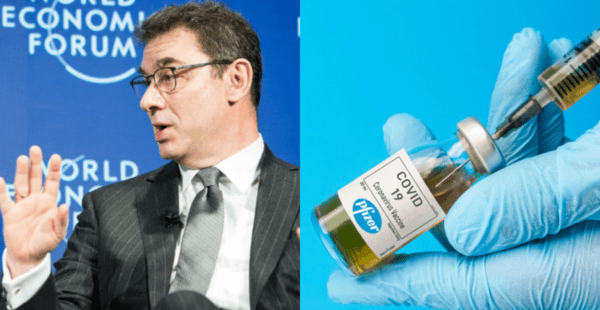
Pfizer CEO Albert Bourla has suggested that a third “booster” shot for their coronavirus vaccine may be necessary within 12 months of the initial dose, followed by an annual vaccination.
“I think there will be a need based on this data for revaccinations,” said Bourla, who’s been the CEO of Pfizer since January 2019. Bourla claimed that a “likely scenario” will show a need for a third so-called “booster” dose of the vaccine, somewhere between 6 and 12 months after the initial shot, “and then from there, an annual revaccination.” Bourla said that variants of the coronavirus will “play a key role” in the upcoming decisions.
Pfizer CEO Albert Bourla says COVID vaccine recipients will "likely" need a third dose between 6-12 months after full vaccination followed by an annual shot.
"But all of that needs to be confirmed," he adds. pic.twitter.com/eCuxXNkOut
— The Recount (@therecount) April 15, 2021
It follows comments made from Alex Gorsky, the CEO of Johnson & Johnson in February to CNBC, who also advised on the possibility of annual vaccinations. “Unfortunately, as [the virus] spreads it can also mutate,” he said at the time. “Every time it mutates, it’s almost like another click of the dial so to speak where we can see another variant, another mutation that can have an impact on its ability to fend off antibodies or to have a different kind of response not only to a therapeutic but also to a vaccine.”
Leftists on Twitter began anticipating public outrage following the Pfizer CEO’s comments on booster vaccinations. Many claimed that it would be no different to the annual flu vaccine, conveniently forgetting that the vast majority of people do not have an annual flu shot, nor have there ever been plans instigated to control access to transport or public places based on whether somebody has a flu shot or not.
People are so confused and annoyed about Pfizer CEO saying we will most likely need a third shot in 12 months… Have they never heard about the *annual* flu vaccine?
— Dr. Elena Falcettoni (@efalcettoni) April 15, 2021
GOP: COVID is nothing worse than a flu
GOP: Pfizer CEO is saying we need a shot every 12 months! This is an outrage!Yes baby you need a flu shot every 12 months I thought this was just like the flu?
— PlasticMan (@Almondrobopanda) April 15, 2021
Pfizer CEO says a 3rd shot may be needed in 12 months…
Ok, Sign me up, better safe than sorry. pic.twitter.com/KXKjcnU2qr
— Trans Lives Matter! *Activist* "Ada " (@AllTransLivesM1) April 15, 2021
National File reported on Tuesday on the joint statement from the CDC and FDA, calling for a halt on the use of the Johnson & Johnson vaccine, citing concerns over fatal blood clot incidents. As a result of the announcement, all federal facilities immediately paused their administering of the Johnson & Johnson vaccine, with a number of states following shortly after:
The reports of blood clots from the Johnson & Johnson vaccine echo those from Europe, where the European Medicines Agency said last week there was a “clear link” between the Oxford AstraZeneca vaccine and blood clots in the brain. Those affected were also mostly young and middle-aged women, and had the same type of very rare clots, known as cerebral venous thrombosis. As a result, a number of European countries, including France, Germany, and Netherlands, along with the UK, then began placing limits on giving the AstraZeneca vaccine to people below a certain age, usually around 60.